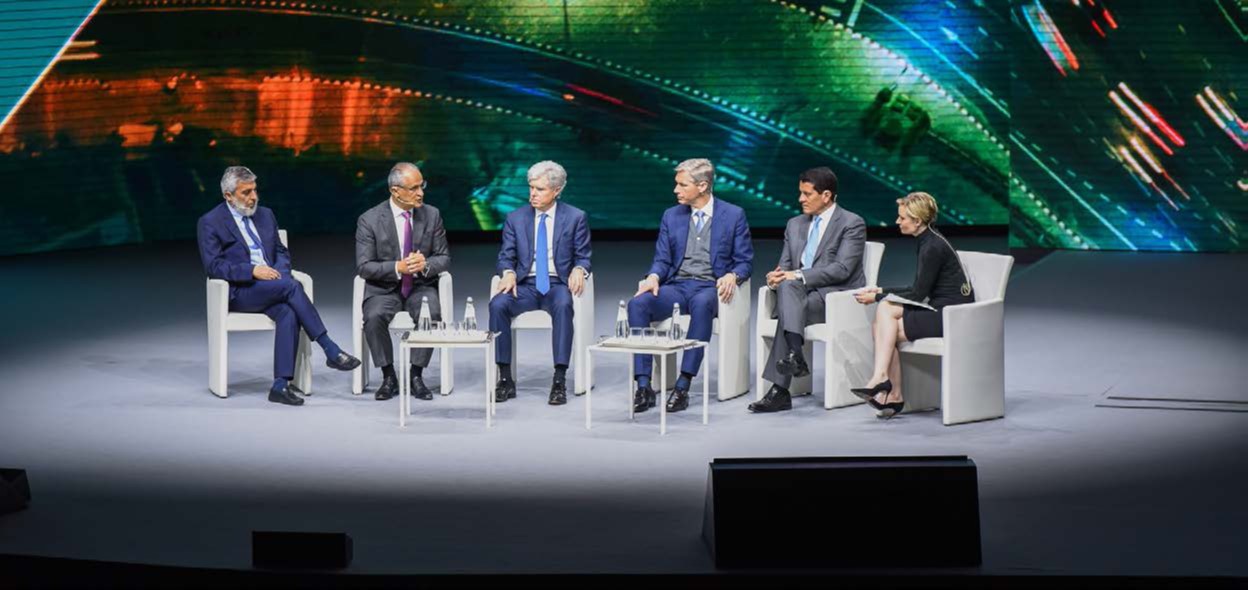-
Featured Solutions
-
Energy Transition
Energy technology to help the industry advance on the path to net-zero
-
Hydrogen Technologies
Advanced technologies to accelerate hydrogen deployment
-
Geothermal Solutions
Experience and expertise to redefine possibilities in geothermal
-
Carbon Capture, Utilization, and Storage (CCUS)
Integrated suite of solutions to capture, process, store, and monitor CO2 emissions
-
Emissions Abatement
Solutions to monitor and reduce emissions from industrial operations
-
Remote Operations
Digital operations, monitoring and testing capabilities to serve critical industries
-
AI by BakerHughesC3.ai
Enterprise-scale artificial intelligence for energy operations
-
Liquefied Natural Gas
Industry leading solutions for long-term reliability, availability, and project success
-
Industrial Technology
Solutions to improve efficiency and uptime in processing and manufacturing industries
-
Cordant™
Flexible and connected digital solutions for industrial machines, equipment, and systems
-
Mature Assets Solutions
Reviving mature Assets and accelerating impact through integrated solutions
-
Flare Reduction
Creating new opportunities for value recovery and efficiency in flare reduction.
-
-
Energy Transition
Energy technology to help the industry advance on the path to net-zero
-
Products & Services
-
Oilfield
-
On-Demand Solutions
-
Onshore Composite Pipe
-
Evaluation
-
GaffneyCline Energy Advisory
GaffneyCline Energy AdvisoryFrom high-level strategy to ground-level execution, trust a proven team of energy advisors to help deliver your projects with greater speed, certainty, and efficiency.
- Process & Pipeline Services
-
Drilling
-
Completions
-
Maximizing Return on Efficiency
-
Completion Fluids
-
Intelligent Completion Systems & Flow Assurance
-
Gas Lift Systems
-
Isolation Valves
-
Liner Hanger Systems
-
Multilateral Systems
-
Multistage Completions
-
Packers
-
Perforating
-
Sand Control
-
Stimulation & Fracturing
-
Subsurface Flow Control
-
Subsurface Safety Systems
-
Tubular Services
-
Well Monitoring and Analytics
-
Maximizing Return on Efficiency
-
Production
-
Integrated Well Services
Integrated Well ServicesOptimize your well operations with proven, comprehensive project management service and support
-
Processing
-
Subsea
-
Well Intervention
InterventionReduce the time and cost of interventions, from well construction to abandonment.
-
Surface Pressure Control
Surface Pressure ControlMaximize drilling efficiency with safe, sustainable, cost-effective well control
-
Decommissioning
-
Digital
-
On-Demand Solutions
-
Turbomachinery & Process Solutions
-
Gas Turbines
Gas TurbinesIndustry-leading gas turbine technologies for mechanical drive and power generation (50/60 Hz)
-
Steam Turbines
Steam TurbinesProven modular designs with the flexibility to meet operating challenges across the oil and gas, and power generation industries.
-
Centrifugal & Axial Compressors
-
Reciprocating Compressors
-
Generators, Synchronous Condensers and Motors
Generators, Synchronous Condensers and MotorsElectro-mechanical solutions that are engineered to perform, built to last, with full life-cycle support.
-
Gearboxes & Gear Couplings
Gearboxes & Gear CouplingsHigh-performance gearing and gear coupling solutions and services to solve the most complex power transmission challenges
-
Expanders & Air Cooled Heat Exchangers
Expanders & Air Cooled Heat ExchangersProviding ultra-high energy efficiency for cryogenic and waste-to-value applications.
-
Remote & Digital Solutions
Remote & Digital SolutionsSmart solutions to help industry operate safely, securely, and efficiently while reducing costs.
-
Turbomachinery Services
Turbomachinery ServicesComprehensive capabilities ensuring the highest availability, reliability, and efficiency for the entire life of your equipment.
-
Centrifugal Pumps
Centrifugal PumpsA proven range of single and multistage, horizontally and radially split designs for long-term reliability in harsh conditions.
-
Valves
-
Talent Development
Talent DevelopmentExtensive and training solutions to develop talent and improve expertise to reduce risks and increase productivity.
-
Gas Turbines
-
Software & Analytics
-
Cordant
-
BakerHughesC3.ai
BakerHughesC3.aiEnterprise-scale AI to make energy operations safer, cleaner and more efficient
-
NDT Software
-
Oilfield Services Digital
-
Cordant
-
Measurement, Testing & Controls
-
Cyber Security Services
-
Downhole Sensors
-
Flame Detectors
-
Flare Management
Flare ManagementUltrasonic flow meters and emissions management solutions for superior flare gas flow measurement and control
-
Flow Meters
-
Industrial Asset Inspection
-
Industrial Radiography and CT
-
Machinery Asset Health & Consulting Services
-
Machinery Diagnostic Services
-
Monitoring Systems
Monitoring SystemsBently Nevada offers condition monitoring systems for plantwide machine monitoring protection.
-
Non-Destructive Testing
-
Nuclear Measurement Solutions
-
Pressure Sensors
-
Process Analyzers
-
Remote Monitoring & Diagnostics
-
Remote Visual Inspection (RVI)
-
Robotic Inspection
-
Roller Bearing Condition Monitoring
-
Sensors
SensorsOur customers rely on the quality and integrity of our vibration sensors to monitor and measure their machinery’s performance.
-
Supporting Services Agreements
-
System 1 Condition Monitoring Software
System 1 Condition Monitoring SoftwareAn all-in-one answer to even your most difficult machine asset management and health monitoring challenges.
-
System Design Installation
-
Test and Calibration Instruments
-
Ultrasonic Testing
-
Cyber Security Services
-
Brands
-
Bently Nevada
-
Bently Training
-
Cyber Security Services
-
Machinery Asset Health & Consulting Services
-
Machinery Diagnostics Services
-
Monitoring Systems
-
Remote Monitoring & Diagnostics
-
Roller Bearing Condition Monitoring
-
Sensors
-
Supporting Services Agreements
-
System 1 Condition Monitoring Software
-
System Design Installation
-
Bently Training
-
Druck
-
Panametrics
-
Reuter-Stokes
-
Waygate Technologies
-
Bently Nevada
-
Oilfield
-
Company
- Baker Hughes
-
Sustainability
-
Sustainability at Baker Hughes
-
People
-
Planet
PlanetWe are committed to operating with sound environmental practices to protect the planet.
-
Principles
PrinciplesOur culture promotes and encourages employees to act with integrity, responsibility, and compliance every day.
-
Reports & Policies
-
Sustainability Strategy
-
Sustainability at Baker Hughes
- News & Knowledge
-
Resources
-
Resources Center
-
Supplier Resources
-
Channel Partner Resources
-
Customer Resources
-
Additional Resources
Additional ResourcesMore information related to Baker Hughes.
-
Resources Center
Panel moderated by Alix Steele, Bloomberg

We’re not doing digital for digital’s sake. I go back to the mission that we have: safe, reliable, affordable, and ever cleaner. And I think digital plays into every single one of them.
Joe Geagea, Executive Vice President, Technology, Projects & Services, Chevron
What’s the number one thing you’re doing in your business in the middle of this energy transition?
Mr. Geagea said that Chevron’s priorities are to be the lowest-cost supplier, to lower the carbon footprint of its operations, and to invest in renewables and technology. Mr. Brekelmans said that providing customers with ever-cleaner energy choice is a focus at Shell. He added that the carbon competitiveness of the entire supply chain must be considered, as well as the suite of products that you’re delivering. For Mr. Sultan, cost efficiency was the most important thing, including the cost of any activity in renewables. He believed that cost and efficiency are greatly dependent on service companies because they are typically more advanced in research and technology. Mr. Breuillac added that the industry must recognize that it’s part of the problem and therefore needs to be part of the solution. He emphasized the need for them to perform better at what they can control, such as reducing emissions from operations, which is at the forefront of Total’s priorities. Mr. Bayon agreed that emissions must be a key focus, but added that the industry needs to be more proactive and transparent, and be part of the solution not only to energy transition, but to helping people worldwide get out of poverty and have access to energy.
Reducing your own emissions, diversifying your portfolio with renewables, reducing your costs, and honoring your shareholders—can you actually do all four things?
The panelists all agreed that it was certainly possible, noting that the industry has a long hisotry of embracing challenges and change. Keenly focused on the environmental side of things, they also emphasizsed that no solution could come from them alone—but that governments, policy makers, customers, and individuals all had to contribute to reducing emissions and energy consumption.
Do you ever see your company as being less oil and more of something else?
Mr. Brekelmans pointed out that, although the five companies represented on stage are often generalized as being the same, they are actually very different when you look at the details, and that they have all changed in various ways over time. He views Shell as an energy company that wants to remain relevant whatever the future brings. He spoke of natural gas as an example of the company’s and industry’s ability to adapt, saying that what was thought impossible 40 or 50 years ago was embraced, and has grown into something very valuable.
How do digital and AI play into this? What’s your company’s strategy?
Mr. Sultan said that the service companies play a big role in that aspect because they are investing in the capabilities and intelligence to maximize the value of data. So it’s a matter of going to the right service companies and tailoring their capabilities to suit your needs. Mr. Breuillac felt that most companies are under-estimating digital in terms of what it can bring to operations, and that the industry is just scratching the surface of what’s possible. He said Total is being very pragmatic because they understand that it requires a lot of time and investment. Mr. Bayon gave the example of refinery engineers looking at throughput pressures and temperatures, while seeing the real-time dollar impact on the same screen. He said that digital has elimitated the separation between the operation and the outcomes, and he wonders about adapting similar tools for emissions.
We need to jointly develop a narrative that is more compelling than we have today. And that narrative will have to constitute in some way also what is possible. And we as companies have shown time and again that we do things that previously people felt were impossible.
Harry Brekelmans, Projects & Technology Director, Shell
It’s bigger than us sitting here. It’s not a problem of industry or regulators or companies. It’s something that we should all own.
Felipe Bayon, CEO, Ecopetrol


